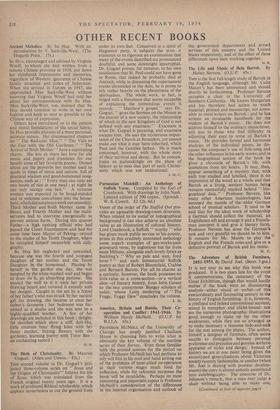THIS is the first full-length study of Bartok in the
English language, although Mr. Colin Mason's has been announced and should shortly be forthcoming. Professor Stevens occupies a chair in the University of Southern California. He knows Hungarian and has therefore had access to much material, printed and manuscript, not acces- sible to most-writers on Bartok ; and he has written an invaluable handbook for the student of Bartok's music. He does not address himself to the ordinary music-lover, still less to those who find difficulty in adjusting their ears to some of Bartok's music. He provides formal and harmonic analyses of the individual pieces, he dis- cusses the composer's use of folk-song and the other influences in his early works; and in the biographical section of the book he gives a chronicle of. Bartok's life, with quotations from his letters. It may, then, appear something of a mystery that, with each tree studied and labelled, there is no impression of the wood as a whole and that Bartok as a living, sentient human being remains successfully masked behind " bio- graphical data." Professor Stevens, like many other American musicologists, has assumed the mantle of the older German school of musical scholars. It used to be said that for the ideal work of scholarship a German should collect the material, an Englishmen sift and arrange it and a French- man interpret it and give it literary form. Professor Stevens has done the German's task and very grateful we should be to him. It remains for Mr. Mason to play the English and the French roles and give us a definitive portrait of Bartok and his music.
M.


































 Previous page
Previous page